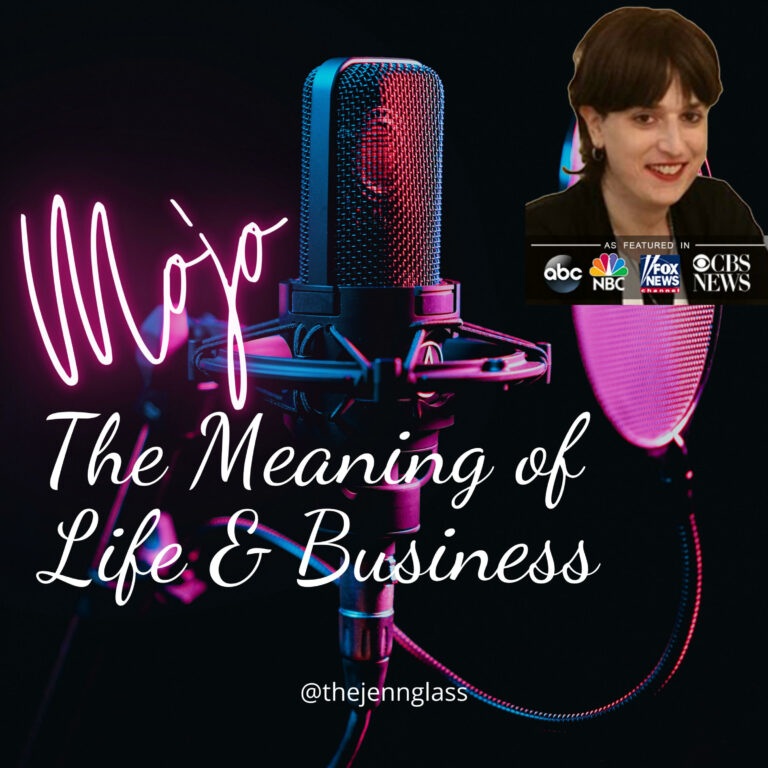What exactly is thought leadership? Leadership is all about what is it that you are doing to make a difference in the lives of others. The problem that so many people have though is they either don’t know how to become a thought leader, or when they are trying to be seen as a thought leader, they are doing it in a we to boost their own egos and not to really be helping others. Listen in as we discuss what a thought leader really is, and what you need to do if you want to be seen as a thought leader in your industry.
I’d also be curious to know, how are you going to change what it is that you were going to do? Let me know, please.

Life & business intersect in many places. After all, we cannot have a business without looking at the human component of business.
This podcast with Jennifer R Glass, CEO of Business Growth Strategies International & BGSICoaching.com is all about the meaning of life and business & the interesting ways they intersect. The show is for entrepreneurs and aspiring entrepreneurs on the search for what makes people successful and how to get there themselves.
Listen in as Jennifer & her guests dive deep into what makes people tick & how they make their businesses work for the betterment of others.
What exactly is thought leadership? Leadership is all about what is it that you are doing to make a difference in the lives of others. The problem that so many people have though is they either don’t know how to become a thought leader, or when they are trying to be seen as a thought leader, they are doing it in a we to boost their own egos and not to really be helping others.
Listen in as we discuss what a thought leader really is, and what you need to do if you want to be seen as a thought leader in your industry.
I’d also be curious to know, how are you going to change what it is that you were going to do? Let me know, please.

Transcript (auto-generated; may contain errors)
Speaker 1 (00:01)
Hello and welcome to another episode of MOJO: The Meaning of Life and Business.
(00:05)
On today’s program, we’re going to be talking about thought leadership. What exactly is thought leadership and how does someone get seen as a leader? For their thoughts to start with, thought leadership is defined as being seen as an expert and sharing what you know with those that are in need of knowing what you know. There’s so much out there.
Speaker 1 (00:33)
When you look, though, at the term thought leadership, back in 2017, very few people were actually looking for the idea of thought leadership. The search trend on the actual term was very low. In 2020, there were nearly 1 billion searches on thought leadership today. There’s over that marketers have seen thought leadership as a buzzword that we have to be talking about. Business owners, entrepreneurs, professionals, investors, experts have all wanted to have been seen as thought leaders.
Speaker 1 (01:19)
One of the conversations I’ve been having with some of my clients over the last several months, especially is how did they start getting seen as experts and sharing that thought leadership with those that need to be knowing who they are? If you’re an expert, people want to work with you because you’re that expert. Think about it this way. If you needed to have open heart surgery, would you go to the cardiologist that just started out? Or would you want that heart surgeon who’s done hundreds or thousands of the same type of procedure that you’re about to be having in the hospital that’s known for this type of service?
Speaker 1 (02:06)
And so when we look at what it means to be an expert, we understand why it’s even more important today than what it may have been seen as in the past, when everybody is in that hyper competitive mode of being seen as an expert, of being seen as somebody that we need to be going to and what we need to do in order to be seen as the thought leader. There’s a lot of things that you need to start looking at as you start thinking about. What does it take to be a thought leader? It’s a kind of messaging that you’re putting out there. What is it that you’re putting out?
Speaker 1 (02:48)
Are you putting out memes? Can a meme be seen as a thought leader? Potentially. Are you putting out thought provoking articles and posts on social media and blog posts on your blog or video blog posts that you’re sharing what you’re doing? Are you using the various live tools on Facebook and LinkedIn and other platforms allowing you to be seen by other people?
Speaker 1 (03:20)
Are you engaging with other people and their posts and sharing insights that other people may not have been thinking? Are you helping other people with your thought leadership, or is it a vain attempt at just increasing your own reputation? You want to be thinking about what is it you’re really doing and why are people going to want to see you as a thought leader, as that expert. Think about it this way. If you’re a forensic accountant or a psychologist being called as an expert witness in a case, yes, you’re going to be seen as an expert.
Speaker 1 (04:04)
Most of us hate though jury duty, and we don’t want to be going to court, and the bulk of us are never going to be seen as an expert for a court case. So when it comes down to it, we’re probably not the right fit for that. But how are you seen in what you do and why you do? Are you seen as somebody that is known as an expert in your particular field? Are you purposely putting content out to shape the conversation?
Speaker 1 (04:42)
Are you doing it again for you? Are you doing it for others? The more that you’re doing for yourself, the less likely people are going to ultimately see you as that expert, though, because they’re going to see through you. If you’re doing it to help others, people are going to have more of a feeling you really care about moving the conversation, about moving the idea through to be making a difference in what you do. I’ve always said, my why in my business is Simon Sinek always says, start with your why.
Speaker 1 (05:24)
I always say, my why is because I want to make our community stronger and our nation stronger. That’s why I do what I do. I’ve always been working with small businesses, helping them find opportunities, find ways to increase their leads, their revenue customers so that they can hire people, so that they can bring more people into their business, hiring more people, giving more to the organizations around them, making their community stronger and our nation stronger. And it doesn’t matter where in the world we are. We all need to be better.
Speaker 1 (06:05)
We all need to be living in a better situation. So what exactly does it mean then in that regard, to be a thought leader? For those of you that are listening, think about what it is that you can do to start sharing your expertise a little bit more. You’re not going to be seen overnight as a thought leader, but can you over time start being seen as somebody that has their pulse on what’s going on, that has the idea and the conviction to see where you’re going to take it, to really start making that big difference, and then maybe you two will start being seen as that fault leader, but it’s going to take a lot of work, and it’s going to take a lot of effort on your side in terms of scheduling, time commitment, and otherwise to ensure that you are going to be putting out the right information, that is going to be seen by others, that they are going to want to work with you and see you as that expert again. As they say, there’s no such thing as an overnight success.
Speaker 1 (07:28)
Most overnight successes take about ten years. What are you going to do though? In your life, in your business and for your own thought leadership and your own expertise to really start making that difference and making you our next thought leader? On that note, this has been another episode of MOJO: The Meaning of Life & Business and until next time, here’s to your success.







